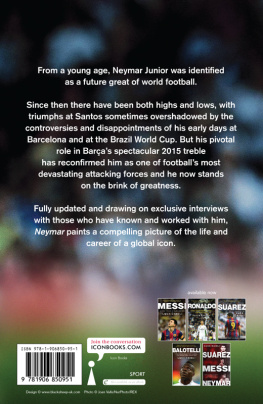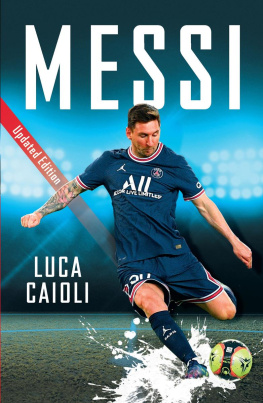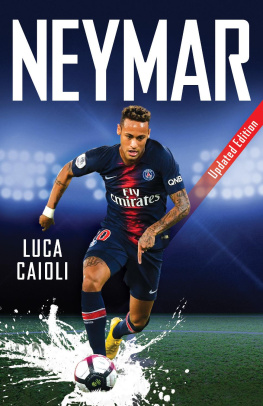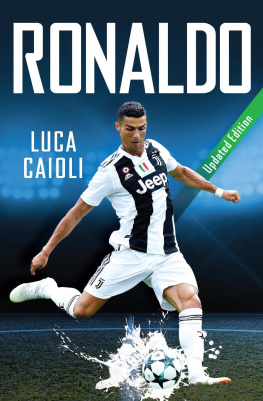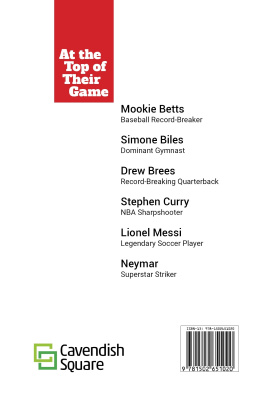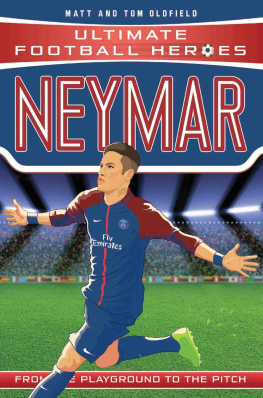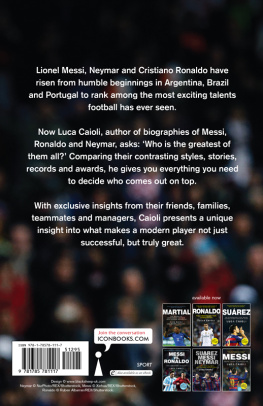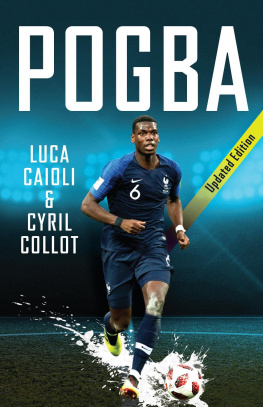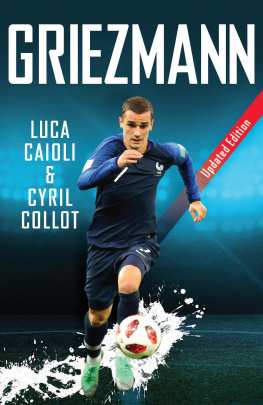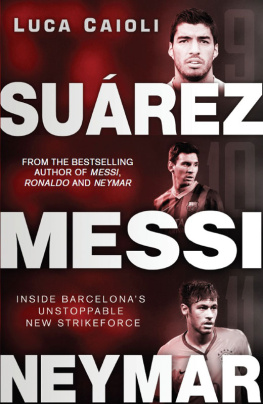NEYMAR
About the author
Luca Caioli is the bestselling author of Messi, Ronaldo and Surez. A renowned Italian sports journalist, he lives in Spain.
NEYMAR
THE UNSTOPPABLE RISE OF BARCELONAS BRAZILIAN SUPERSTAR
Updated Edition
LUCA CAIOLI

This updated edition first published in the UK in 2015 by Icon Books Ltd
Previously published in the UK in 2014 by
Icon Books Ltd, Omnibus Business Centre,
3941 North Road, London N7 9DP
email:
www.iconbooks.com
Sold in the UK, Europe and Asia
by Faber & Faber Ltd, Bloomsbury House,
7477 Great Russell Street, London WC1B 3DA or their agents
Distributed in the UK, Europe and Asia
by TBS Ltd, TBS Distribution Centre, Colchester Road
Frating Green, Colchester CO7 7DW
Distributed in Australia and New Zealand
by Allen & Unwin Pty Ltd, PO Box 8500,
83 Alexander Street, Crows Nest, NSW 2065
Distributed in South Africa
by Jonathan Ball, Office B4, The District,
41 Sir Lowry Road, Woodstock 7925
Distributed in India by Penguin Books India,
7th Floor, Infinity Tower C, DLF Cyber City, Gurgaon 122002, Haryana
Distributed in Canada by Publishers Group Canada,
76 Stafford Street, Unit 300, Toronto, Ontario M6J 2S1
Distributed to the trade in the USA by
Consortium Book Sales and Distribution,
The Keg House, 34 Thirteenth Avenue NE,
Suite 101, Minneapolis, Minnesota 55413-1007
ISBN: 978-190685-095-1
Text copyright 2014, 2015 Luca Caioli
Translation of chapters 131 copyright 2014 Charlie Wright
Translation of chapters 3234 copyright 2015 Sheli Rodney
The author has asserted his moral rights.
No part of this book may be reproduced in any form, or by any means, without prior permission in writing from the publisher.
Typeset in New Baskerville by Marie Doherty
Printed and bound in the UK by
Clays Ltd, St Ives plc
Chapter 1
Praa Charles Miller
Handlebar moustache, out-of-control quiff, white shirt, black shorts and football clamped between his hands: the photos from times past, those where a puff of magnesium was used as a flash, provide us with an image of Charles William Miller.
Charlie, son of John, a Scottish engineer who like 3,000 other Brits ended up in South America to help build the railways, and Carlota Fox, a Brazilian with English ancestors, was born in So Paulo, in the Brs district, on 24 November 1874. When he was nine years old, he was sent to Europe to study, as was customary in high society. He arrived in Southampton and started out at Banister Court School before going on to a secondary school in Hampshire.
Banister was a small private school founded by Reverend George Ellaby as a place where captains of the Peninsular Steam Navigation Company could send their sons. The headmaster during Millers time was Christopher Ellaby, son of Reverend Ellaby. Christopher Ellaby was a passionate follower of football.
In England, the beautiful game already had its official rulebook, with the Football Association having been founded in London on 26 October 1863. This was the first national football federation which brought together the rules of the game. Ellaby, during his Oxford years, was captain of the college team. He passed on his enthusiasm for the game to his students.
Charles Miller was a competent athlete and soon became the captain of the school team. They gave him the nickname Nipper because of his smooth baby face and stick insect body. Despite his build, he became an excellent centre forward and on occasions he played left wing. He is our best striker. He is fast, his dribbling is excellent and he has a shot on him like a thunderbolt. He scores goals with great ease, was how the school paper reported on him. Forty-one goals in 34 matches with Banister Court and three goals in thirteen matches with St Marys Church of England Young Mens Association, who would become Southampton Football Club, now a Premier League team, attest to this. Millers style of play was light-footed and a bit on the cheeky side. He had great imagination, superb ball control and a passion for the dummy which left his opponents baffled. So much so that at seventeen he was invited to play for Corinthian Football Club in London, a club set up with players from British schools and universities to match the then superiority of the Scottish teams Corinthian, a name which, years later, with Millers advice, would become one of the most famous clubs in So Paulo (albeit it would be called Corinthians).
1894. After Charlie finished his studies, he went back to Brazil. In his luggage he put two Shoot footballs, made in Liverpool, a present from a teammate; an air pump to blow them up, a pair of football boots, two football tops (one from Banister and one from St Marys) and a hefty tome containing the rules and regulations of the Football Association. The story goes that during this trip home Charlie did not stop training, dribbling round passengers and obstacles from one end of the ship to the other. On 18 February Charlie docked in Santos and John, his father, asked him what he had brought back from England. Charlie replied, My degree. Your son has graduated with distinction in football.
The twenty-year-old Anglo-Brazilian began to work, like his father, at the So Paulo Railway Company. He registered with the So Paulo Athletic Club, which had been founded in May 1888 by British communities. There, members played cricket, not football. They knew how to play but no one was interested in it until Charles Miller started to lay the foundations.
At the club, he explained the rules, and also terminology such as half-time, corner, ground and penalty to his friends, workmates, and top officials at the Gas Company, the Bank of London and the railways. Eventually he pulled together a group of followers. He convinced them to train on a ground at Vrzea do Carmo, between Luz and Bom Retiro, nowadays known as Rua do Gasometro. There were plenty of people who were curious to see what was going on at the ground. Not long after, Celso de Arajo wrote in a letter to his friend, journalist Alcino Guanabara of Rio de Janeiro: Near Bom Retiro, there is a group of Englishmen, maniacs as only the English can be, who are kicking around what only can be described as something which looks like a cows bladder. It would appear that this thing gives them great joy but also great pain when this sort of yellowish bladder enters a rectangle made of wooden poles.
Sceptics aside, football between gentlemen in the British community was beginning to gain a foothold, and Miller finally managed to organise a match on 14 April 1895. In Vrzea do Carmo, two teams made up of Brazilians and Englishmen came together: So Paulo Railway and Companhia de Gs. The Railwaymen won 42, captained by Miller, who scored two goals. There were few spectators: friends, managers and employees plus some donkeys that were grazing nearby. It did not matter, however, as it was the first official football match in Brazil. This was the day that the most popular sport in Brazil was born.
It is true that before Charlie returned home to Brazil from England, employees from English companies and British sailors played matches in the street or on the beaches of Rio between 1875 and 1890, with one game being played in front of the residence of Princess Isabel, who ruled the Brazilian Empire under the name of Dom Pedro II. It is true that at So Luis College in Itu, the Jesuit Father Jos Montero introduced the game of bate bolo, a game played by professors and pupils, like Etonians used to. It is also true that games such as
Next page
